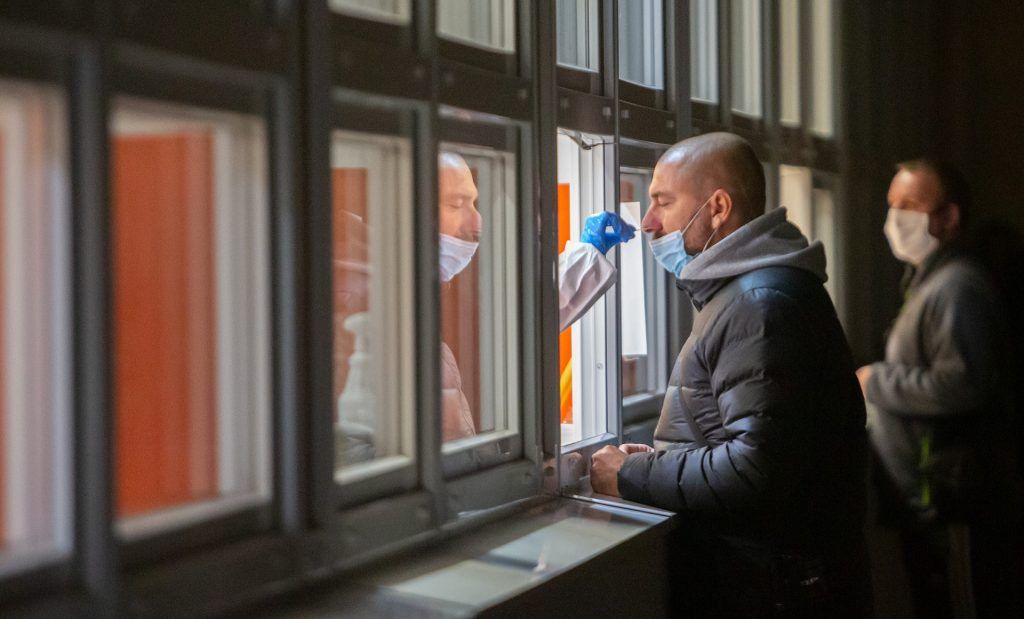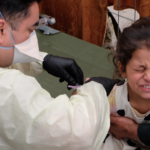Think a year of COVID-19 has been tough? Try decades (or longer)
By Matt Field | February 17, 2021
 A coronavirus test. Credit: lukasmilan / pixabay.
A coronavirus test. Credit: lukasmilan / pixabay.
Another expert panel has weighed in with the distressing assessment that the coronavirus causing COVID-19 will circulate for years to come. Nature asked 100 infectious disease experts whether they thought the SARS-CoV-2 virus would become endemic and 90 percent think the answer is yes. But don’t send out a Zoom invite for all of your future birthday parties just yet; scientists don’t know how much of a threat endemic COVID-19 will be.
Aside from complete eradication—something that’s happened with the coronavirus that caused the SARS outbreak in the early 2000s and smallpox—the most benign outlook for the new coronavirus is that it becomes endemic along with four human coronaviruses that circulate and cause the so-called “common cold.” When a daycare calls a parent in 2026 to report a case of sniffles, “there’s a chance the virus that killed more than 1.5 million people in 2020 alone will be the culprit,” Nature’s Nicky Phillips wrote.
Of course, even now many cases of COVID-19 are mild or asymptomatic, but if the new virus behaves like the other endemic coronaviruses in the future, it likely won’t pose such a threat to older adults, either. With the four human coronaviruses, kids are usually exposed before age six, Jennie Lavin, an Emory University researcher who developed a model for how new coronavirus might transition to an endemic disease, told Nature. People’s immune defenses against endemic human coronaviruses like OC43—which some researchers think caused the deadly “Russian flu” pandemic of the late 19th Century—eventually weaken, leaving them vulnerable to reinfection. But OC43 now is one of the viruses that cause cold symptoms.
Experts say mass vaccination, while perhaps not a strategy for eradicating the new coronavirus, will make society’s path forward smoother. Whether people will need to schedule regular COVID-19 shot as they do (or should do) with the influenza vaccine remains to be seen. Roy Anderson, an infectious disease epidemiologist at Imperial College London, told National Geographic, “we’re going to have to have constant vaccination, and we’re constantly going to have to have a very sophisticated molecular surveillance program to keep track of how the virus is evolving,”
But Lavine and her colleagues suggest in their Science article outlining their model that if COVID-19 goes the way of like other endemic coronaviruses, “continued vaccination may not be needed as primary cases recede to mild childhood sniffles.” Even if the new coronavirus mutates so it can get around the immune response people develop contracting it, it still may not cause the level of serious disease it does today. According to the Nature article, evolutionary biologist Jesse Bloom and his colleagues have found that antibodies to a version of the endemic coronavirus 229E, which circulated in the late 1980s and early 1990s, are “much less effective” against the newer variants of the virus. (Bloom’s study has yet to be peer reviewed.) But people infected by 229E, one of the four endemic coronaviruses, usually experience only cold-like symptoms.
COVID-19’s transition from a potentially deadly disease to a much less serious ailment, if it happens, won’t occur right away. It may take years or decades, Lavine told Nature, for the number of COVID-19 infections to stabilize to a constant level across years and the pandemic to enter an endemic phase.
The results of the Nature panel are broadly similar to the warnings from experts at the World Health Organization and in the US government. “We need to plan that this is something we may need to maintain control over chronically,” US National Institute of Allergy and Infectious Diseases director Anthony Fauci told a UK think tank last fall. World Health Organization emergencies program director Mike Ryan told an end-of-the-year press briefing that, “The likely scenario is the virus will become another endemic virus that will remain somewhat of a threat.”
Together, we make the world safer.
The Bulletin elevates expert voices above the noise. But as an independent nonprofit organization, our operations depend on the support of readers like you. Help us continue to deliver quality journalism that holds leaders accountable. Your support of our work at any level is important. In return, we promise our coverage will be understandable, influential, vigilant, solution-oriented, and fair-minded. Together we can make a difference.
Keywords: COVID-19, endemic pathogens, human coronaviruses, vaccines
Topics: Analysis, Biosecurity, Disruptive Technologies















